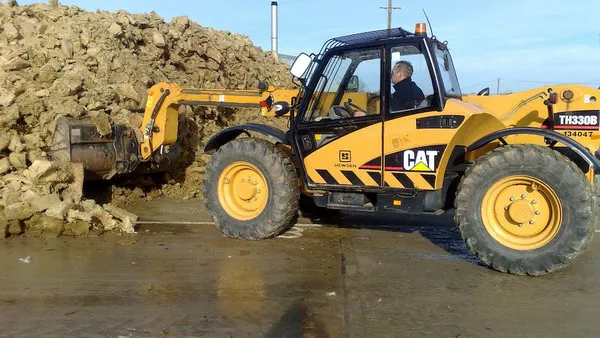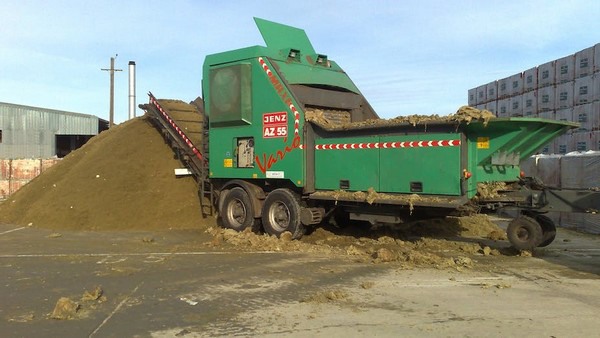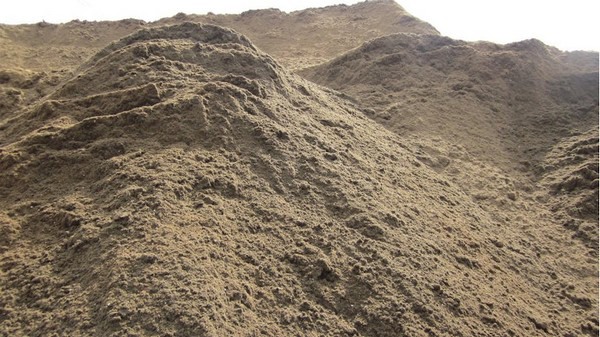One of the biggest questions in agriculture is how to recycle waste. Whether it's drip tape, mulch film, nursery pots, or growing media, each product has been challenged to find a new life after being used by growers. The average recycling rate in the US is just around 30%, according to the EPA. This includes traditionally recycled materials, residential consumer-grade materials such as polyethylene terephthalate, "plastic bottles," and cardboard. Because of these infrastructure limitations, agriculture products have an integration challenge with recycling. This is especially true for materials like stone wool that are already distinct in cultivation environments.
To answer this challenge, Grodan has been in collaboration with the leading agricultural recycler in Canada to provide an automated and advanced stone wool recycling option for growers throughout the province of Ontario. Grodan and Walker Industries have worked together for the past five years to help bring an innovative solution to the marketplace.
At Walker's Alltreat Farms facility, they have developed an automated processing line capable of removing plastic packaging, crushing stone wool blocks and slabs, and decontaminating the material of viruses, bacteria, and other residues. Together, we have processed and recycled 10,000 tons of stone wool through Walker Industries' facilities across Ontario. The end product: a high-grade potting mix sold to retailers for personal and commercial use.
Agriculture waste management challenges
A number of factors present challenges for agricultural recycling, including:
- Equipment challenges. Many of the traditional recycling facilities lack the specific equipment required to process and handle plastic film—a common component of various growing media.
- Transportation of post-harvest materials. There is a logistical cost and challenge to transporting post-harvest materials from often remote and rural locations to the small number of agricultural recycling facilities that exist.
- Preparing the media for a secondary application. To create a viable product for future use, one has to efficiently break down and sterilize various substrate materials to remove and deactivate chemical inputs and any pathogens present.
- Regulatory challenges. In most jurisdictions, there are specific medicinal crop disposal laws. Many states and provinces allow for on-site applications for used media, while others have strict rendering mandates. These regulations are often overly burdensome and encourage cultivators to mix waste materials such as kitty litter and sawdust to determine the resulting product "unusable and unrecognizable," which limits recycling post-harvest.

How Walker Industries and Grodan developed stone wool recycling in Ontario, Canada
In December 2022, Walker Industries showcased how it solved many of these challenges in a special exhibition at Alltreat Farms, where it is recycling stone wool substrate used by local greenhouses. Attendees included representatives from the Ontario Ministry of Agriculture, Food, & Rural Affairs and local environmental officials, as well as the participating greenhouse growers.
The automated recycling process at the Alltreat Farms facilities is the result of years of collaborative research and testing between Walker and Grodan to create a reliable, scalable process for repurposing stone wool. It starts with Grodan's consistently growing media products that are as easy to transport post-harvest as when they first come off the manufacturing line, thanks to their uniform sizes and shapes.
Walker uses a custom, automated de-packaging system for Grodan blocks and slabs to separate the growing media from its plastic wrapping. From there, the stone wool is mixed with wood chips and other organics and then shredded into fine particles. After the material leaves the de-packaging line, it is divided into windrows (static piles used for active composting). Walker uses the latest GORE cover for waste treatment to help ensure internal temperatures in the windrows are raised to effectively destroy any pathogens, such as harmful microbes, bacteria, and viruses that may be present.
After the compost windrow is properly sterilized, the resulting mixed material is conveyed to a packaging line to be bagged and sold as high-end potting soil to the retail market alongside traditional residential and commercial organic waste streams. The Alltreat Farms automated manufacturing process produces over 26 bags of 13.5 kg potting soil per minute over 18 hours a day. That's over 85,000 kg of potting soil that's sold to growers throughout Canada.
Innovations to recycle stone wool
An efficient, high-output automated recycling line like this doesn't just happen overnight. Seemingly simple challenges can have major impacts on a full-scale operation. For example, many seasonal greenhouses harvest in the late autumn and winter when temperatures are dropping well below freezing. This temperature drop causes the root balls to freeze and harden, placing expensive equipment at risk of jamming or breaking.
Finding a way through complex logistical challenges and regulatory landscapes is not as simple as, say, pitching an old Gro-Block in the trash after harvest. But developing new and innovative recycling solutions is crucial if we are to build a sustainable agricultural industry—and future-proof agriculture as a whole through climate-smart practices.
Grodan works tirelessly to propel recycling capabilities and has developed an ever-expanding network of recycling service providers that accept post-harvest mineral wool in North America and worldwide. As the greenhouse industry across North America continues to diversify and as environmental recycling groups learn more of the potential markets for post-harvest mineral wool media, more and more facilities will join in the accomplishments.
For more information:
Grodan
www.grodan.com
